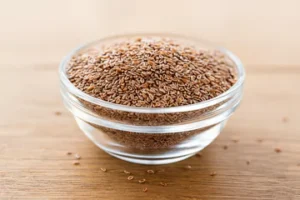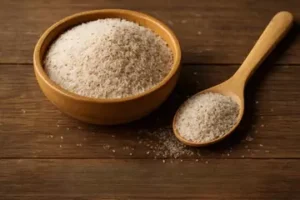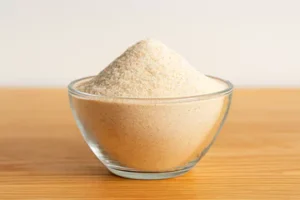Psyllium Husk
Introduction
Psyllium husk is a natural, plant-based source of soluble fiber derived from the seed husks of the Plantago ovata plant, commonly known as blond psyllium or isabgol. This plant is primarily cultivated in India, which accounts for over 80% of global production, with smaller cultivation in regions like Pakistan and the Middle East. Isabgol is rich in fiber and mucilage. Mucilage is a colorless gelling agent capable of expanding in volume as it absorbs water up to 40 times its weight. The husk, the outer coating of the psyllium seed, is separated through a mechanical process and used as a dietary supplement due to its high fiber content and unique gel-forming properties. Psyllium husk has gained popularity worldwide for its health benefits, particularly in supporting digestive health, heart health, and metabolic function. India is presently the major producer and exporter of isabgol husk in the world.




Composition & Properties
Psyllium husk is composed primarily of soluble fiber (approximately 70–80%) with a smaller amount of insoluble fiber. The main active component is a mucilage, a type of polysaccharide that absorbs water to form a viscous, gel-like substance. This gel-forming ability is key to its therapeutic effects. The husk is low in calories, gluten-free, and contains minimal fat, protein, or carbohydrates, making it a versatile addition to various diets. Its neutral flavor allows it to blend easily into foods and beverages without altering taste significantly.
The nutrients present in psyllium husk are as follows:
- Protein: 0.94%
- Albumin: 35.8%
- Globulin: 23.9%
- Prolamin: 11.7%
- Total carbohydrates: 84.98%
Forms & Usage
Isabgol, also known as psyllium husk, is primarily available in two main forms: powder and husk. Within these forms, there can be variations based on particle size (fine or coarse) and whether they are flavored or sugar-free. Additionally, some manufacturers offer isabgol in capsule form.

Whole Husks:

Powder:

Coarse Powder:

Capsules:

Pre-mixed Supplements:

Psyllium Husk (Whole Seeds/Husk):

Straight Psyllium Husk (Coarse Mesh):

Sterilized Psyllium Husk Powder:
Health Benefits
Digestive Health:
- Constipation Relief: Psyllium husk increases stool bulk and moisture, promoting regular bowel movements. It’s a gentle, non-habit-forming laxative, making it suitable for occasional or chronic constipation.
- Diarrhea Management: The gel-forming property helps absorb excess water in the intestines, firming up loose stools and aiding in diarrhea control.
- Irritable Bowel Syndrome (IBS): Psyllium can alleviate symptoms of IBS, such as bloating and irregular bowel movements, by regulating gut motility.
- Gut Microbiome Support: As a prebiotic, psyllium husk provides nourishment for beneficial gut bacteria, supporting a healthy microbiome.
Heart Health:
- Cholesterol Reduction: Soluble fiber in psyllium binds to bile acids in the gut, promoting their excretion and reducing low-density lipoprotein (LDL) cholesterol levels. Studies suggest 5–10 grams daily can lower LDL cholesterol by 5–20%.
- Blood Pressure: Some research indicates psyllium may contribute to improved blood pressure control when combined with a heart-healthy diet.
Blood Sugar Regulation:
- Psyllium slows the absorption of glucose in the intestines, helping to stabilize blood sugar levels. This makes it beneficial for individuals with type 2 diabetes or those at risk of developing it.
Weight Management:
- The fiber in psyllium promotes satiety by expanding in the stomach, which may reduce appetite and aid in weight control when paired with a balanced diet and exercise.
Managing Hemorrhoids:
- Supplementing isabgol in the diet is helpful in managing hemorrhoids. Since isabgol helps in dealing with both constipation and loose stools, it would also help in managing hemorrhoids. In a comparative study, people treated with a placebo of B vitamins had no major difference, and those consuming isabgol had a reduction of bleeding.
Managing Type II Diabetes:
- Studies on a population with type II diabetes have shown that isabgol husk effectively improved glycemic and lipid control after meals.
Other Potential Benefits:
- Psyllium may support colon health by reducing inflammation and promoting regular elimination, potentially lowering the risk of conditions like diverticulitis.
- Its mucilage properties can soothe irritated mucous membranes in the digestive track.
